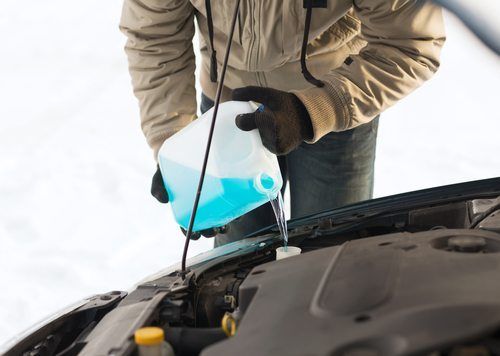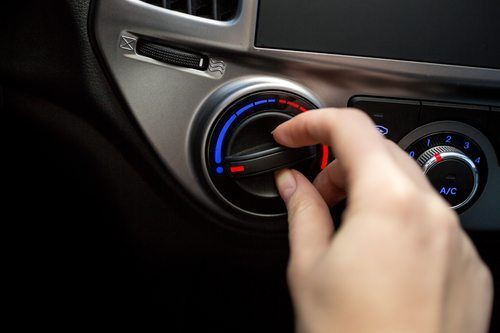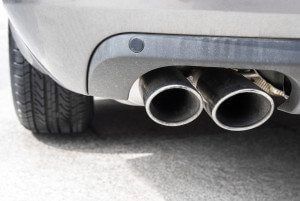How Does Antifreeze Work?

Don’t you love it when a product’s name tells you exactly what it does? Antifreeze, also known as coolant, is one such product. This brightly colored solution lowers a liquid’s freezing point, which is why we add it to our vehicles’ radiators. A mixture of chemicals and water, antifreeze helps ensure that the liquid in our radiators doesn’t freeze in the winter or boil over in the summer (overheating the engine), and in doing so, it protects our engines from damage year-round. However, you might be wondering: how does antifreeze work?
Although water is able to hold some of an engine’s heat, most engines require a mixture of water and chemicals, more commonly known as antifreeze. This product is a crucial component of the cooling system, as it helps the car operate in a variety of temperatures, from the frigid cold to the scorching heat. Most of the time, engine coolant is made of a combination of water and ethylene glycol (C2H6O2).
So how does antifreeze protect your engine? The key lies in the boiling and freezing points.
BOILING & FREEZING POINTS
Pure water, as you may know, has a boiling point of 212°F (100°C) and a freezing point of 32°F (0°C). However, when you create a 50/50 mixture using water and ethylene glycol, the boiling point rises to 223°F (106°C) and the freezing point lowers to -35°F (-37°C). When you take it one step further, creating a 30/70 mixture of water and ethylene glycol, the boiling point rises to 235°F (113°C) and the freezing point lowers to -67°F (-55°C).
Why does this happen? Well, when water freezes, it expands and crystallizes. If we add chemicals to water, however, the molecules will have to work harder to join together and crystallize. Their struggle results in a lower freezing point. So in the end, inexpensive water and functional coolant form the perfect pair.
CYCLING THROUGH THE SYSTEM
To maintain the cooling system’s temperature, antifreeze is pumped through the engine and the heater core, where it absorbs excess heat. It also runs through the radiator, dissipating heat to the outside air. The antifreeze runs through this cycle continuously until it becomes old and contaminated. Eventually, of course, it will need to be replaced to ensure that it remains effective.
Although water is useful in many ways, its properties make it a substandard cooling product. Antifreeze was developed to add strength to water, reducing its deficiencies and broadening its capabilities. Without it, you could destroy your engine and cause corrosion and sediment build-up. Extreme temperatures add to the problem. Why take the risk?If you’re ready to schedule a cooling system flush for your vehicle, contact Seeburg Service Center today. We have been in the auto repair business since 1972, and although we specialize in mufflers and exhaust systems, our expertise extends to all sorts of car repairs and maintenance, including cooling system flushes. Our two auto shops are locally owned and operate in Fayetteville (AR) and Rogers (AR). To contact our efficient, knowledgeable mechanics, simply give us a call or schedule an appointment online. We look forward to hearing from you!





